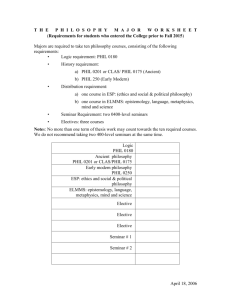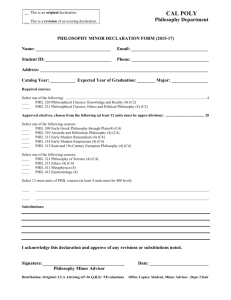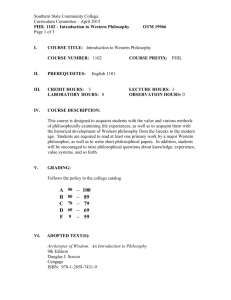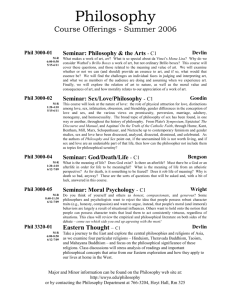UCD-Department of Philosophy Course Descriptions Fall Semester
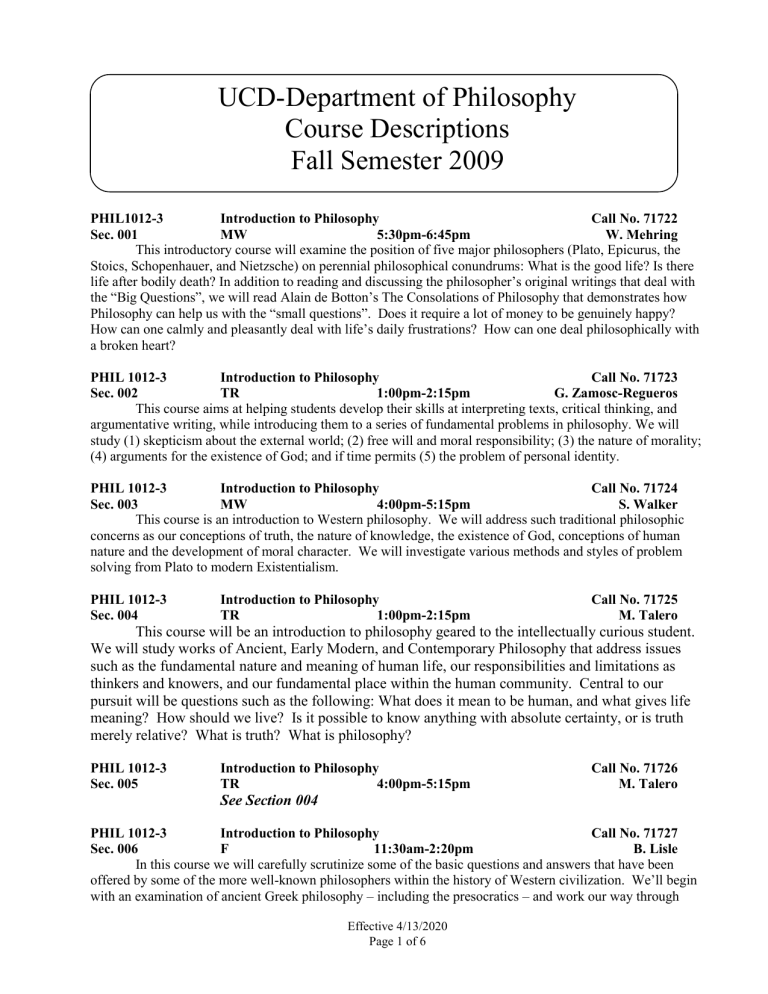
UCD-Department of Philosophy
Course Descriptions
Fall Semester 2009
PHIL1012-3 Introduction to Philosophy Call No. 71722
Sec. 001 MW 5:30pm-6:45pm W. Mehring
This introductory course will examine the position of five major philosophers (Plato, Epicurus, the
Stoics, Schopenhauer, and Nietzsche) on perennial philosophical conundrums: What is the good life? Is there life after bodily death? In addition to reading and discussing the philosopher’s original writings that deal with the “Big Questions”, we will read Alain de Botton’s The Consolations of Philosophy that demonstrates how
Philosophy can help us with the “small questions”. Does it require a lot of money to be genuinely happy?
How can one calmly and pleasantly deal with life’s daily frustrations? How can one deal philosophically with a broken heart?
PHIL 1012-3 Introduction to Philosophy Call No. 71723
Sec. 002 TR 1:00pm-2:15pm G. Zamosc-Regueros
This course aims at helping students develop their skills at interpreting texts, critical thinking, and argumentative writing, while introducing them to a series of fundamental problems in philosophy. We will study (1) skepticism about the external world; (2) free will and moral responsibility; (3) the nature of morality;
(4) arguments for the existence of God; and if time permits (5) the problem of personal identity.
PHIL 1012-3
Sec. 003
Introduction to Philosophy
MW 4:00pm-5:15pm
Call No. 71724
S. Walker
This course is an introduction to Western philosophy. We will address such traditional philosophic concerns as our conceptions of truth, the nature of knowledge, the existence of God, conceptions of human nature and the development of moral character. We will investigate various methods and styles of problem solving from Plato to modern Existentialism.
PHIL 1012-3
Sec. 004
Introduction to Philosophy
TR 1:00pm-2:15pm
Call No. 71725
M. Talero
This course will be an introduction to philosophy geared to the intellectually curious student.
We will study works of Ancient, Early Modern, and Contemporary Philosophy that address issues such as the fundamental nature and meaning of human life, our responsibilities and limitations as thinkers and knowers, and our fundamental place within the human community. Central to our pursuit will be questions such as the following: What does it mean to be human, and what gives life meaning? How should we live? Is it possible to know anything with absolute certainty, or is truth merely relative? What is truth? What is philosophy?
PHIL 1012-3
Sec. 005
Introduction to Philosophy
TR 4:00pm-5:15pm
See Section 004
Call No. 71726
M. Talero
PHIL 1012-3
Sec. 006
Introduction to Philosophy
F 11:30am-2:20pm
Call No. 71727
B. Lisle
In this course we will carefully scrutinize some of the basic questions and answers that have been offered by some of the more well-known philosophers within the history of Western civilization. We’ll begin with an examination of ancient Greek philosophy – including the presocratics – and work our way through
Effective 4/13/2020
Page 1 of 6
some of the most influential movements and thinkers in Western thought: thinkers such as Plato, Aristotle,
Descartes, Hume, Kant, Marx, Kierkegaard, Heidegger and Sartre. We will read each thinker as sympathetically as possible, with an attitude of charity, and then examine some of the well-known critiques of each thinker. This course is a survey course that emphasizes the close reading and critical interpretation of canonical texts. It is also designed to help each student develop and sharpen the specific kinds of academic writing skills that allow one to clearly articulate a complicated line of reasoning.
PHIL 1012-3
Sec. 007
Introduction to Philosophy
TR 2:30pm-3:45pm
Call No. 71728
M. Tanzer
This course will examine fundamental philosophical issues through the thought of Plato, Descartes,
Berkeley, and Hume. We will focus on problems in the theory of knowledge, other issues addressed will include the relationship between knowledge and morality, the existence of God, the nature of objects, and the nature of the human being.
PHIL 1012-3 Introduction to Philosophy
Sec. 0L1 Online
See HTTP://WWW.CUONLINE.EDU. $100 course fee
Call No. 71720
M. Boring
Call 303-556-6505 for more information.
“It is only by reflecting on the world around us that we come to know ourselves.” Do these ancient words still ring true today? Has our post-modern condition made the activity of personal reflection a worthless activity? Or, does today’s world demand more than ever that we seek for ourselves the meaning of our lives?
In philosophy we address such questions of self reflection by turning to a number of very specific issues, particularly: The nature of knowledge and reality; the legitimacy or illegitimacy of belief in God; The foundations of morality and politics. Using a topic-based approach we will address these challenging issues in a rigorous yet deeply fulfilling way.
PHIL 1012-3
Sec. 0L2
Introduction to Philosophy
Online
See HTTP://WWW.CUONLINE.EDU. $100 course fee
Call No. 71721
M. Boring
Call 303-556-6505 for more information.
See OL1 for description.
PHIL 1020-3 Introduction to Ethics & Society Call No. 71730
Sec. 001 MW 8:30am-9:45am B. Lisle
In this course we will examine specific ethical issues from a select set of philosophical perspectives.
We will start by reading and discussing some of the more well-known ethical theories in Western philosophy.
Then we’ll investigate specific ethical issues through the perspectives offered by these theories. We will survey key concepts and issues such as individual and group rights, political and interpersonal oppression, animal rights, abortion, euthanasia (or “mercy killing”), war, poverty, self-deception, gender identity, and the general question regarding one’s moral obligation(s) to one’s family, country and/or community.
PHIL 1020-3 Introduction to Ethics & Society Call No. 71731
Sec. 002 TR 10:00am-11:15am S. Walker
The purpose of this course is to provide the student with useful tools for solving ethical problems. We will investigate major positions from the philosophic tradition of ethics from Plato to Sartre. We will work toward the understanding of moral terminology and the development of moral reasoning through the examination of contrasting ethical theories. We will consider such issues as virtue, rights, and our obligations to others.
Effective 4/13/2020
Page 2 of 6
PHIL 1020-3
Sec. 003
Introduction to Ethics & Society
MW 11:30am-12:45pm
Call No. 71732
C. Shelby
Studies some of the traditional problems in ethics that tend to be focused on individual morality within the larger context of social and political philosophy. Some specific contemporary moral and social problems may be addressed, such as AIDS, abortion, famine, and individual rights versus the collective rights of society.
PHIL 1020-3
Sec. 004
Introduction to Ethics & Society
TR 1:00pm-2:15pm
Call No. 71733
S. Walker
See Section 002
PHIL 1020-3
Sec. 005
Introduction to Ethics & Society
MW 10:00am-11:15am
Call No. 71734
B. Lisle
PHIL 1020-3
Sec. 006
See Section 001
Introduction to Ethics & Society
TR 4:00pm-5:15pm
Call No. 71735
W. Mehring
All who live in this world must choose what to do. Yet to live in the world we must live with people.
When we make choices involving people we are engaged in ethical activity. Ethical debates arise from those situations where there is disagreement about: 1) how we should treat others and 2) the reasons (or arguments) for treating them in one way rather than another. This course will examine specific ethical theories as well as more concrete issues such as abortion, the death penalty, sexual morality, and the environment, etc. Our goal will be to gain a better understanding by reading, thinking, and talking carefully and critically.
PHIL 1020-3
Sec. 007
Introduction to Ethics & Society
MW
Same as Section 001
11:30am-12:45pm
Call No. 71736
B. Lisle
PHIL 1020-3
Sec. OL1
Introduction to Ethics & Society
Online
Call No. 71729
A. Winters
See HTTP://WWW.CUONLINE.EDU to obtain call number for course.
$100 course fee. Call 303-556-6505 for more information.
PHIL 2441-3 Logic and Language Call No. 71737
Sec. 001 MW 11:30am-12:45pm M. Tanzer
The aim of this course is to learn how to construct precise, rational arguments, as well as to critique arguments put forth by others. Our assessment of the key elements that constitute proper argumentation will include the examination of the functions of the basic parts of an argument, the recognition of logical fallacies, and the understanding of the formal structure of arguments.
PHIL 2441-3
Sec. 002
Logic and Language
MW 2:30pm-3:45pm
Call No. 71738
W. Mehring
Logic is the tool with which we can best analyze claims and their supporting evidence. Using logic is a key part of independent thinking, and as such is one of the most empowering skills we can develop. In this course we’ll focus on informal logic and applying logic in everyday life. We will also play with the more common forms of deductive reasoning (logic puzzles) that are employed on the GRE or LSAT.
PHIL 3002-3
Sec. 001
Ancient Greek Philosophy
TR 11:30am-12:45pm
Call No. 71739
R. Metcalf
This course will cover the development of Greek philosophy, from the earliest Presocratics to
Aristotle, with special focus on the ancient conceptions of “nature,” physis.
Effective 4/13/2020
Page 3 of 6
PHIL 3032-3 20 th Century Analytic Philosophy Call No. 74909
Sec. 001 MW 1:00pm-2:15pm C. Shelby
This course surveys the development of the analytic side of the alleged Anglo-Saxon analytic vs. continental philosophy distinction, as one line of response to the transcendental idealism of the 18th century author Immanuel Kant. Beginning (for those who are not familiar with the work of Kant) with a discussion of
Kant's philosophical contributions, the course follows the trail of one kind of reaction to Kant's so-called
Copernican Revolution in Epistemology-the kind of reaction that understands the meaning of the experience and knowledge that Kant describes in terms of logic and language. The topics that come to concern the analysts, as we will discover, extend beyond the meanings of mere propositions, to such larger issues as what we mean when we say that something causes something else, what we could possibly intend when we say that something is a law of nature, and what we can legitimately be said to know about any of this.
PHIL 3250-3
Sec. 001
Business Ethics
TR 8:30am-9:45am
Call No. 71740
Staff
Surveys some of the major moral problems which arise in business, such as the nature and scope of the moral responsibilities of corporations, affirmative action and truth in advertising. Begins with a study of moral reasoning, ethical theory, and the challenges of applying ethical theory.
PHIL 3280-3 War and Morality Call No. 71741
Sec. 001 MW 10:00am-11:15am S.
Walker
War continues to exist, in part, due to our inability to come to terms with it adequately. Some claim certain wars to be just. Others have argued that war itself opens the door to a condition so extraordinary that it negates the possibility of any legitimate ethical evaluation. In this course we will attempt to identify and analyze some of the major moral issues of war. When is a war just, and when is it not? Are there moral means of conducting a war? What are morally acceptable rules of engagement? What if anything justifies violating them? How does one evaluate terrorism as a means of conducting war? Given the topic of this course we will likely generate more questions than answers. Readings will include, among others, works by St. Augustine,
Hobbes, Walzer, Nagle, Sartre, Milne, Gandhi and Buber.
PHIL 3500-3 Ideology and Culture: Racism and Sexism Call No. 71744
Sec. 001 TR 2:30pm-3:45pm C. Kautzer
Although race and gender are notoriously difficult concepts to get a handle on, the racial and gender dimensions of identity are some of the most potent in our social world, contributing to social, political, and economic inequality and discrimination. Indeed, one of the reasons that race and gender defy final definition is because they are continually contested, reconstructed, and intersecting—unbound by biology. In this course we investigate the dynamic of material and ideological forces, social movements, and individual actions at work in the formation of racial and gender identities. Through contemporary readings, we will also learn the philosophical tools necessary for ideology critique and enhanced individual and collective self-determination.
PHIL 3500-3
Sec. 002
Ideology and Culture: Racism and Sexism
TR
See Section 001
11:30am-12:45pm
Call No. 74910
C. Kautzer
PHIL 3500-3
Sec. OL1
Ideology and Culture: Racism and Sexism
Online
See HTTP://WWW.CUONLINE.EDU.
$100 course fee. Call 303-556-6505 for more information.
Call No. 71743
B. Goodrich
This course is an examination of the individual concepts of ideology, culture, racism, and sexism. More importantly, it is an examination of the relationships and dependencies between and among these concepts. Facile attempts to explain any of these concepts such that they seem anything less than complex, complicated, and interdependent will neither be offered nor will they be
Effective 4/13/2020
Page 4 of 6
Call No. 00000
encouraged. The students will be both the subjects and the objects of inquiry since each or us has an ideology and a culture and each of us has been the originator or the target of racism and sexism. We will attempt to step outside of our own ideology, culture, race and sex (as nearly as this is possible) to examine the concepts, their social and political meanings and power, and our own participation in them. This course will muddy the waters, as it were, rather than clarify and simplify. It will provide many more questions than answers.
PHIL 3550-3 Philosophy of Death and Dying Call No. 71745
Sec. HO1 F 3:00pm-5:50pm W.
Mehring
Among the topics this course will explore are: First, the question of whether there is life after bodily death. We will begin with the classical arguments of Plato and the Epicureans, tracing this debate through the modern era. We will be especially concerned with the current debate over what evidential value Near Death
Experiences, reports by psychics, and other death related phenomena have for a rational belief in personal survival after bodily death. Secondly, we will examine how philosophy helps in grief recovery after a death and other losses. Finally, we will consider some of the most important current ethical controversies surrounding death and dying such as suicide, and capital punishment. Books read will include Mitch Alborn’s immensely popular Tuesdays with Morrie, and Callanan and Kelley’s Final Gifts .
PHIL 3981-3
Sec. 001
Chinese Philosophy and Culture
MW 2:30pm-3:45pm
Call No. 72862
S. Coggan
Cross listed with RLST 3660
China is a fascinating world with its own characteristic orientation to philosophical questions. Chinese thinkers produced the “Flowering of a Hundred Schools of Thought” in the Axial Age, the same period of time in which philosophy was coming to birth in ancient Greece. Covers some of the Chinese schools including
Confucianism, Taoism, Mohism, Legalism, Chinese “logic”, and the later schools of Neo-Confucianism, Neo-
Taoism and Chinese Buddism.
PHIL 4000/5000-3 Nineteenth-Century Philosophy: Diremption, System, Call No. 75536/75537
Sec. 001 and Critique C. Kautzer
W 5:30pm-8:20pm
In this course we delve into the explosive philosophical developments and debates of nineteenthcentury Europe. Responding to the radical potential of the French Revolution, Kant’s critical philosophy, and the apparent disintegrating force of modern subjectivity and emerging capitalist economies, post-Kantian
Idealism sought to incorporate all of nature and human experience into a dynamic (metaphysical, ethical, and political) system. After a sustained engagement with the culmination of this mode of philosophizing in Hegel’s
Absolute Idealism, we take up two critical responses in the work of Karl Marx and Friedrich Nietzsche. Some familiarity with the work of Hegel and Marx is recommended, but not necessary.
(Please contact Prof. Kautzer if you are interested in suggested preparatory readings.)
PHIL 4220/5220-3 Aesthetics Philosophy Art Call No. 75533/75534
Sec. 001 TR 4:00pm-5:15pm D. Hildebrand
This course presents an introduction to the philosophy of art and aesthetics. In part, this means familiarization with a variety of methods: Platonic, Aristotelian, Romanticist, idealist, Marxist, phenomenological, existentialist, pragmatist, feminist and postmodernist aesthetic theories, for example. It also means consider all sides of the communication that is art: the creative process of artists, the object-events created or artworks, and the audience's ability to experience, interpret, and evaluate art. In the course of this survey, a variety of problem-areas related to art will be considered: for example, what is a work of art? What is taste or beauty and who determines and justifies those standards? How is meaning conveyed by works of art and what methods of interpretation best reveal meaning? What is an aesthetic experience and why is it special?
What are the social, political, and philosophical roles of art products and art criticism in contemporary society?
Our attempts to grapple with these theories and problems will utilize as much actual art as possible through multimedia technology and, hopefully, field trips to local art sites.
Call No. 72865
Effective 4/13/2020
Page 5 of 6
PHIL 4250/5250-3 Environmental Ethics
Sec. 001 M 5:30pm-8:20pm
Call No. 72863/72864
M. Talero
For most inhabitants of developed countries, modern technology has created material prosperity that is unequaled in history. It has also created environmental threats to the whole planet of almost inconceivable magnitude: global warming, endangered species, pollution, resource depletion, and ecological collapse.
This course will investigate the way that philosophy helps us understand and think about environmental issues. We will be asking questions such as these: What is the relationship between human experience and the natural world? Does nature have any value apart from the use that we make of it? Has our contemporary economic system and technological lifestyle alienated us from the local places where we live?
Does resolving our environmental problems also require addressing gender and social inequities? How obligated are we to live differently and promote social changes in response to our worsening environmental situation? What alternatives for living differently are genuinely open to us today?
To explore these questions, we will examine some of the most influential movements in recent environmental thought, which may include eco-phenomenology, deep ecology, social ecology, ecofeminism, bioregionalism, local knowledge, and the philosophy of technology. We will also consider issues such as externalities, the tragedy of the commons, sustainable development, environmental conflict resolution and environmental activism.
PHIL 4760/5820-3 Kant
Sec. 001 TR 4:00pm-5:15pm
Call No. 71748/72861
M. Tanzer
Immanuel Kant's revolutionary thought represents one of the most important developments in the history of Western philosophy. As a result, all subsequent philosophical thought has had to take Kant's transcendental idealism, and its radical re-conceptualization of the subject/object distinction, into account. This course will consist of a detailed examination of Kant's ontology, epistemology and ethics.
PHIL 4833/5833-3 Existentialism Call No. 72865 /72866
Sec. 001 MW 4:00pm-5:15pm G. Zamosc-Regueros
This course examines one of the most influential and rich traditions in Western philosophy. We will begin with existentialism's 19th century roots, and then continue on to the existentialist philosophers of the
20th century. Figures covered may include Kierkegaard, Nietzsche, Heidegger, Sartre and Camus. We will explore their views on topics as diverse as being, death, meaning, value, freedom and authenticity.
Effective 4/13/2020
Page 6 of 6


